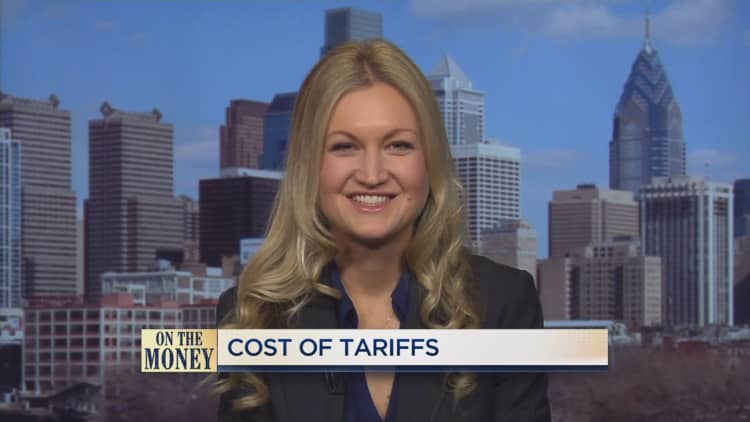
President Donald Trump's tariffs may come at a cost to foreign aluminum and steel producers, but higher costs will likely hit consumers in the wallet, too.
"A tariff is essentially a tax, for all intents and purposes," Stifel Financial's chief economist Lindsey Piegza told CNBC recently. Some economists expect producers will find a way to pass the extra costs along to consumers, primarily in the form of higher product prices.
The tariffs, expected to start late next week, will bring a 25 percent increase in steel and 10 percent on aluminum imports.
"We really do expect price increases on aluminum and steel specifically, but we're also looking for cost increases in all products that heavily rely on (them) as a productive input, " Piegza said to CNBC's "On The Money" in an interview.
When Trump's policy decision was announced earlier in March, Commerce Secretary Wilbur Ross told CNBC the tariffs were "no big deal" and would have a "trivial" impact on prices. To make his point, the billionaire brandished a can of soup on air, saying the tariffs would only have a marginal impact on consumers.
Piegza, however, took the opposite view.
"From a consumer standpoint, pop can makers, soup can makers, beer manufacturers, we do expect an increase in price about two to six cents per unit," the economist told CNBC.
While that probably won't be high enough to deter the purchase of a six pack of beer or soda, Piegza added: "If this is passed on directly to the consumer, it can easily sway them from making certain purchases on a daily or monthly basis. When you talk about this on an annual pace, that's hundreds of millions of dollars."
The protection of U.S. jobs was a primary goal when Trump announced his intention to implement these tariffs, but Piegza sees the potential for loss as offsetting the possible gain.
"You are talking about a couple hundred thousand jobs that certainly will see increased protection," Piezga said, pointing to domestic steel and aluminum workers. "On the other hand, you're talking about increasing prices and potentially squeezing out workers from other sectors , there you're talking about millions of workers. "
Beyond protecting jobs and trying to negotiate better deals with trading partners, the president has another stated goal in implementing aluminum and steel tariffs.
"There is a national security component here," Piegza told CNBC.
"We do want to make sure we do have a minimal manufacturing base here in the U.S., to protect domestic interests, particularly during a wartime economy," she said. "So it is important we have certain protections in place."
On the Money airs on CNBC Saturday at 5:30 am ET, or check listings for air times in local markets.



